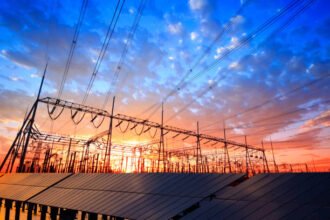India is at the crossroads of its energy journey. With the global leader among the fastest-growing economies, India is facing the twin challenge of driving economic growth and limiting environmental degradation from accelerated industrialization. Having committed to becoming net-zero by 2070, India has set itself a bold commitment. Solar power is the key to this process of change among the sources of renewable energy. We at Kundan Green Energy believe that solar energy is not a substitute—it’s the energy that will redefine India’s future on clean energy.
A Transformational Opportunity
India is one of the warmest travel destinations in the world, with over 300 days of sunshine annually. This is a once-in-a-century chance to harvest abundant sunshine and convert it into inexpensive, clean energy. An emerging, decentralized, and steadily declining technology, solar energy is ideal for a country with a long-term rural reach, rapidly expanding metropolitan agglomerations, and diverse socioeconomic requirements.
Solar is essential to India’s net-zero goal, and it’s not just its pledge is that solar can replace fossil fuel in an equitable, sustainable energy policy. Solar produces no greenhouse gases when utilized, unlike oil or coal. Solar reduces reliance on imported fuels and makes India energy independent, economically robust, and climate compliant.
Economic Necessity Meets Environmental Emergency
The transition to solar is also prompted by growing energy demands in India, doubling by 2040. To meet this demand, traditional methods would result in a doubling of emissions and reverse efforts toward sustainability. Solar is cleaner and less expensive as a solution for this.
The past decade has witnessed the cost of solar power fall by nearly 85%—one of the cheapest sources of energy on earth. This is what India’s growth strategy requires, as clean energy is not a cost but an enabler of growth, which is inclusive.
Apart from this, the solar sector contributes to the country’s economy through the creation of jobs. Right from manufacturing panels to installing them on rooftops and operating solar parks, the sector creates lakhs of job opportunities, primarily in rural India. Kundan Green Energy is happy to be contributing to national sustainability and livelihoods through our renewable projects.
Solar Energy and Decentralized Empowerment
One of the characteristics of solar power is decentralization. While massive thermal power stations entail massive infrastructure, solar may be dispersed anywhere—either in large utility-scale installations or on rooftops, fields and farms, or highways.
Rural India is being transformed with decentralized solar technology such as mini-grids and off-grid powering irrigation pumps, small-scale industries, clinics, and schools. Solar brings energy access with reliability, creates local economies, and arrests village-city migration due to the absence of energy.
For the city of India, solar on the rooftop gives the silver bullet of energy autonomy to households, schools, and industry. With policy support for net metering, customers can even be “prosumers”—producing electricity for themselves and exporting excess to the grid. This democratization of energy is the substance of a just and fair net-zero future.
Solar as a Pillar of National Policy
India’s global leadership on climate is reflected in visionary policies such as the National Solar Mission, International Solar Alliance, and PM-KUSUM, which are solar mainstreaming plans in agricultural, industrial, and household sectors.
Solar parks enable mass-scale grid integration by the government with reduced transmission loss and stabilization of supply. Domestic manufacturing policy for PV modules, batteries, and inverters also benefits Atmanirbhar Bharat by reducing dependency on imports.
Solar power is hence the convergence point of energy security, economic policy, and environmental policy. It is the pivot around which the master plan of India’s future in the field of renewables hangs, giving the country the ability to take the world along in the endeavor of climate action.
Technological Innovation and Solar Growth
The future of the sun is not panels and power plants—it’s innovation. Floating solar farms over reservoirs, bifacial solar panels, and trackers are all part of the technology innovation that is pushing efficiency to all-time highs. Solar-energy storage technology, particularly solar-plus-battery solutions, is engineering out intermittency so that it’s now possible to have round-the-clock renewable power.
Kundan Green Energy wishes to invest in clean energy ventures of the future in the areas of solar, wind, and storage. Kundan Green Energy’s vision is that the world sees renewable energy not only as a source of energy but as a lifestyle—policing electric mobility, green hydrogen, and smart infrastructure.
Solar and the Industrial Transition
Industry accounts for massive amounts of India’s carbon emissions. Industrial consumption needs to be phased down on solar power for net-zero emissions. Solar captive power plants, rooftop installations over factories, and solar-powered process heat systems are lowering industry carbon footprints.
Since sustainability is competitiveness, low-carbon manufacturing is the world’s market summons. Bowing to the sun is ushering Indian industry into the global competitive mainstream, ESG-compliant, and onto the green finance platform.
Road Ahead: Promises and Challenges
While there are well-defined benefits, the cost of large-scale solar has its related issues—land, grid connection, finance cost, and supply chain saturation. These requirements call for long-term visioning, facilitative policy, and corporate responsibility.
That is where players like Kundan Green Energy enter the picture. We are well aware that our role extends far beyond the production of electricity—we are allies to India’s green future. We dream that with local community alliances, wise investments, and growth through innovation, we may be pioneers in solar growth in commercial, industrial, and rural environments.
India’s net-zero isn’t any single person’s work but everyone’s work, and solar is that collective spirit that can drive government, industry, and people together.
A Path of Promise and Possibility
India’s net-zero aspiration is as much a green fantasy—it’s a fantasy of cleaner air, greener cities, and a healthy economy. The easiest way is solar power. It’s everywhere, flexible, and aligned with the long-term vision of the country.
Fast forward to 2070 and onwards, the sun is not just a source of light—it is the light unto the transformation of the nation. We at Kundan Green Energy are fortunate enough to be adding our bit to it, paving the way for the sun in India’s corner pillar of climate action.
With every panel and every megawatt that we build, we are not just generating power—we are building hope, potential, and a renewable future for generations to come.
– Mr. Udit Garg, Managing Director & CEO of Kundan Green Energy
















